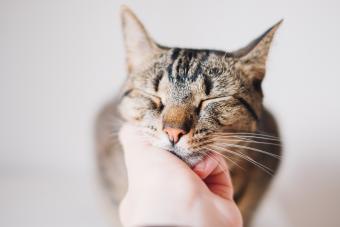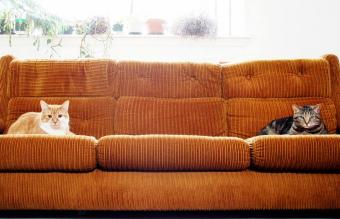
Cats are smart and inquisitive creatures, much like us. If your feline friend seems a bit disinterested, or perhaps more on-edge or even naughty, it's not just a lack of enthusiasm — it could mean they're frustrated with the same-old-same-old of kitty life. Let's explore the subtle signs of cat boredom and how to add a dash of excitement to their daily adventures.
Prolonged boredom in cats may not only affect their well-being but could also lead to unwelcome behaviors like aggression, stealing, and destruction. Let's be proactive in keeping our cat pals happy and engaged!
Bored Cats Might...
As a behaviorist, I recommend clients check with their veterinarian for any underlying health issues in their cats before exploring behavioral causes. After your veterinarian rules out any medical issues, boredom can be a prime suspect if you're seeing any of the following:
Cats are notorious for hiding illness, so any changes in your cat's behavior should be scoped out by a veterinarian before assuming boredom.
1. Sleep More
Cats are known for their love of sleep, often spending a large portion of their day napping. And, while cats sleep more during winter, it's important to distinguish between their normal sleep patterns and excessive sleeping. If you notice your cat sleeping more than usual or displaying a general lack of energy and enthusiasm, this could mean they feel like there's nothing to do.
2. Over-Groom
When cats are bored, they can become stressed and may turn to grooming themselves excessively to keep busy. This could lead to skin irritation, fur loss, or even sores if they're consistently licking the same area. Usually, it's the legs, belly, or somewhere on their sides that they overgroom. but, again, it's important to run this by your veterinarian before assuming boredom, as many other causes of overgrooming can be medical.

3. Overeat
Some cats may turn to food as a source of comfort when they're bored. Just like humans, cats can engage in emotional eating as a way to cope with their feelings. If there's nothing else to do, like humans, cats may overindulge in their food. This behavior, if you allow it to continue, can lead to weight gain and associated health problems like obesity, diabetes, and joint problems.
4. Be More Aggressive
A lack of stimulation can lead to frustration in cats, manifesting as aggressive or irritable behavior. This could include biting, scratching, or sudden mood changes. And if you think about it, we aren't really thrilled when we're bored either.
5. Be More Destructive
When cats feel bored, they might start engaging in behaviors that can be destructive, like scratching your furniture, pushing items off shelves, or causing general mischief around the house. These actions are typically a cat's way of self-entertainment and a way for them to get rid of excess energy. When my cats are bored, they'll hop on the counter and literally push random things off onto the floor.

RELATED: 10 Naughty Cat Memes: Hilarious Purr-petrators Caught
6. Vocalize More
Excessive meowing, yowling, or other vocalizations can be a sign of boredom in cats, especially if it’s a new behavior or happens more frequently than usual.
7. Have Less Interest in Playing
A playful cat who gradually shows less interest in toys, interactive games, or typical playful interactions could be signaling that their environment is no longer providing the excitement and engagement they need. This lack of interest in play might also be accompanied by other signs of boredom, such as increased sleep, over-grooming, or even acting out with destructive behaviors. That said, sudden changes in any cat's behavior are more likely signalling something medical, so this should be determined in coordination with your veterinarian.
8. Become Compulsive
If you observe your cat engaging in repetitive or compulsive behaviors, such as pacing back and forth or excessively licking surfaces, it's a strong indicator that they may require more stimulation in their daily routine. These behaviors often arise when cats are not mentally or physically challenged enough, leading them to develop these habits as a way to cope.
Also called "stereotypic" behaviors, obsessive and compulsive behaviors in zoo animals are a well-documented response to the stress of an unnatural environment where an animal can not express their natural behaviors. Research into these behaviors has made way for a wave of enrichment research that's led to improvements at zoos, aquariums, and domestic homes!
How to Entertain a Bored Cat
Creating a stimulating environment for cats is vital to preventing boredom and negative behavior. I've included some quick ways to spice up your cat's environment below, but definitely check out these cat enrichment ideas to reduce boredom.
1. Interact With Your Kitty
Engaging with your cat and spending time playing can be super helpful. Spending quality time with your cat not only strengthens the bond between you and your feline friend but also stimulates their mind and keeps them physically active. Use a feather wand or a laser pointer for play sessions that mimic hunting behavior to provide mental and physical stimulation for your cat.
RELATED: 6 Ways to Exercise Your Indoor Cat & Disguise It as Play
2. Make Your Own Cat Toys
Creating DIY cat toys and activities can be a fun and rewarding way to provide mental and physical stimulation for your feline friend. For example, you can make a simple puzzle feeder by poking holes in a cardboard box and placing treats inside.
As your cat tries to retrieve the treats, this activity engages their natural hunting instincts and provides mental stimulation. Plus, interactive play stations can be crafted using household items such as cardboard, PVC pipes, and old fabric to create a maze or obstacle course, making it an easy, fun way to give your cat some good fun.
RELATED: Easy Homemade Cat Toys
3. Change Up Their Environment
Cats have natural instincts that require an outlet, even in indoor settings. A few ideas to spark curiosity in your cat include:

- Cat perches: Grab your kitty a few cat perches and put them up next to the window so they can watch wildlife from a distance. You might even see their super-adorable cat chattering as they spot their favorite bird on a feeder.
- Cat trees: Cat trees can be a lot of fun for your kitty. Check out making this cat tree, or buy your own.
- Shelving: Kitty shelves allow your cat to climb high and see the world from a different perspective. Get ideas for creating a vertical cat playground that looks as great as your cat.
Indoor vs. Outdoor Cats
Although you may be tempted to let your cat go outside so they have more to do, this isn't a recommended option if you can help it. According to research published in Animals, "uncontrolled outdoor access is associated with a number of welfare concerns for companion cats, including increased risks of disease and parasites, injury or death due to traffic, predation or ingestion of toxic substances, and getting permanently separated from their owner."
To ensure your cat's safety while satisfying their desire to be outdoors, consider constructing a catio or another secure outdoor enclosure.
Be Proactive
Boredom can have a significant impact on a cat's physical and mental health, leading to stress, anxiety, and the development of detrimental habits. By recognizing the potential for boredom in cats, owners can take proactive steps to provide an enriching and stimulating environment, ultimately improving their feline companion's quality of life.







